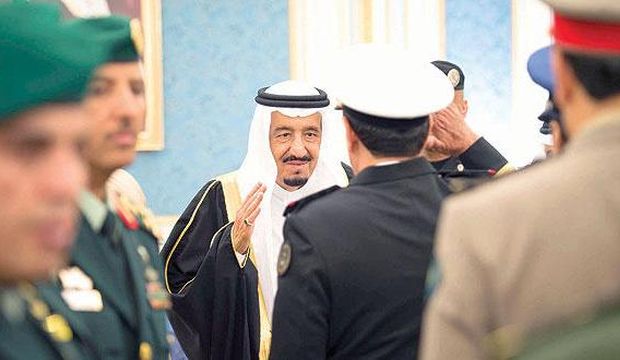
Saudi Arabia’s King Salman Bin Abdulaziz (C) greets members of the Saudi military at the Yamama Palace in Riyadh, Saudi Arabia, prior to his televised address to the nation, on March 10, 2015. (Asharq Al-Awsat/Bandar Galoud)
Riyadh, Asharq Al-Awsat—Saudi King Salman Bin Abdulaziz made a series of phone calls to regional leaders on Thursday evening to discuss the ongoing military campaign against the Iran-backed Houthi militia in Yemen, the state-owned Saudi Press Agency (SPA) reported.
The Custodian of the Two Holy Mosques made phone calls to Jordan’s King Abdullah II, Egyptian President Abdel-Fattah El-Sisi, the King of Bahrain Hamad Bin Isa Al Khalifa, Emir of Kuwait Sheikh Sabah Al-Ahmed Al-Jabir Al-Sabah and Emir of Qatar Sheikh Tamim Bin Hamad Bin Khalifa Al Thani and Sudanese President Omar Al-Bashir.
The telephone calls came on the same day Saudi warplanes began an aerial offensive against Houthi targets in Yemen. The campaign dubbed “Operation Decisive Storm” brings together an alliance of Arab nations including Morocco, the United Arab Emirates, Bahrain, Qatar, Kuwait, Jordan, Sudan and Egypt.
Saudi warplanes bombed the northern stronghold of Yemen’s Shi’ite rebels and key military installations on Friday, on the second day of the campaign.
The Houthi rebels have swept across Yemen, capturing the capital Sana’a in September and are now advancing towards the south.
The internationally recognized president of Yemen, Abd Rabbuh Mansur Hadi, fled the southern city of Aden on Wednesday, arriving in Saudi Arabia on Friday.
In comments issued on Thursday, spokesman of the Saudi-led coalition Brig. Gen. Ahmed Asiri said that “phase one” of the campaign had been successful. He revealed that objectives including the destruction of Houthi air defenses, airbases, on-the-ground aircraft and ballistic missile capabilities, as well as silencing their command-and-control centers, had been achieved.
Speaking during the first press briefing following the launch of Operation Decisive Storm, Asiri stressed that Saudi Arabia’s air force operations would continue, and did not rule out a ground operation in the future.
“Currently there is no plan regarding the participation of ground forces in the ongoing operations, but if necessary, Saudi ground forces are ready, as well as ground forces of friendly and sisterly countries, in order to deter any aggression of any kind,” the spokesman said.
“The operations will continue as long as there is a need for them to continue, until all our goals are achieved. The goal is to prevent the Houthi militia from harming the Yemeni people and its neighbors,” he added.
The White House also confirmed it was coordinating with Saudi Arabia and regional allies in the joint military action against the Houthis, including providing intelligence and logistical support.
“In support of GCC [Gulf Cooperation Council] actions to defend against Houthi violence, President Obama has authorized the provision of logistical and intelligence support to GCC-led military operations. While US forces are not taking direct military action in Yemen in support of this effort, we are establishing a Joint Planning Cell with Saudi Arabia to coordinate US military and intelligence support,” US National Security Council spokesperson Bernadette Meehan said on Wednesday.
“We strongly urge the Houthis to halt immediately their destabilizing military actions and return to negotiations as part of the political dialogue,” she added.
